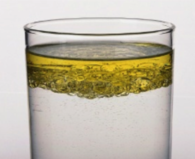 | ||||
Chemistry of Solutions
Practice Test Questions
from Science Prof Online
Chemistry of Solutions Practice Test Questions
Free review questions to help students better understand the
 | ||||||
SPO VIRTUAL CLASSROOMS
The following questions are designed to help students better understand the chemistry of solutions. All questions are based on materials that can be found on the Chemistry of Solutions Lecture Main Page.
1. In a solution, what is the general term for the substance that is dissolved?
a. solute
b. solvent
c. solid
d. compound
e. liquid
2. A solution in which the solute and solvent are evenly distributed is considered to be ...
a. heterogeneous
b. hydrophobic
c. homogeneous
d. adhesion
e. a hydrogen bond
3. Hydrophilic means ...
a. water hating
b. non-polar
c. water loving
d. hydrophobic
e. heterogenenous
4. The covalent bond that holds a water molecule together is ...
a. polar
b. non-polar
c. hydrophobic
d. hydrophilic
e. hydrogen
You have free access to a large collection of materials used in a college-level introductory Cell Biology Course. The Virtual Cell Biology Classroom provides a wide range of free educational resources including Power Point Lectures, Study Guides, Review Questions and Practice Test Questions.
Page last updated: 10/2015
The SPO website is best viewed in Microsoft Explorer, Google Chrome or Apple Safari.
5. An example of the cohesive property of water is ...
a. surface tension
b. a heterogenous solution
c. a homogeneous solution
d. a hydrophobic solution
e. a sugar water solution
6. Which are examples of the "like dissolves like" rule of solubility?
a. a sugar water solution
b. oil and water
c. a mineral oil and vegetable oil solution
d. both b & c
e. both a & c
7. Water is called the “universal solvent” because it can dissolve...
a. polar covalent compounds
b. non-polar covalent compounds
c. ionic compounds
d. bot a & b
e. both b & c
8. The chemical bonds responsible for the cohesive property of water are ...
a. polar covalent
b. non-polar covalent
c. ionic
d. hydrogen
e. both a & d
f. both a & c
 | ||||||
Need Help with Chemistry?
SPO offers free PowerPoint lectures, sample test
questions, review questions and assignments on many different science topics.
Below are links to those that relate to chemistry:





